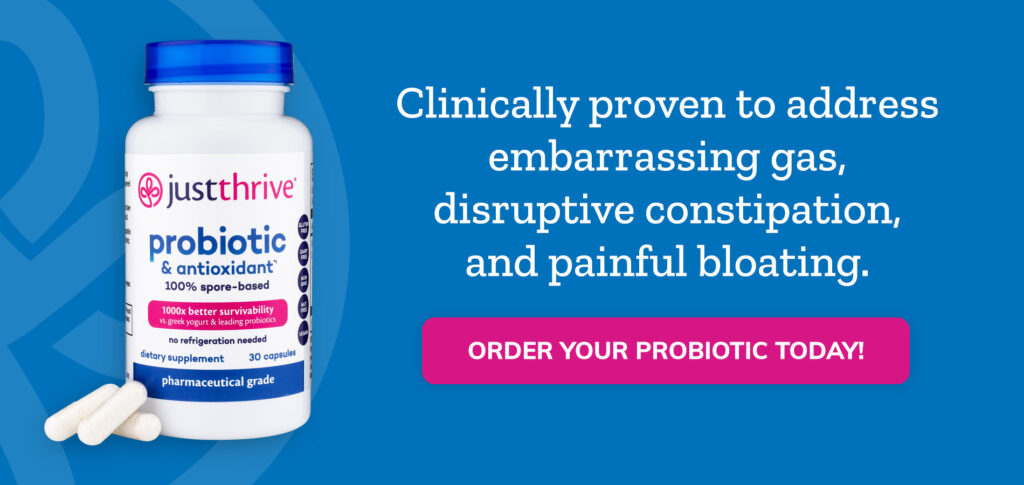Table of Contents[Hide][Show]
The symptoms are embarrassingly, and sometimes painfully, clear.
Constipation…
Frequent trips to the bathroom…
Cramping, bloating, and gas…
All signs pointing to 3 letters: IBS.
But what exactly is IBS, and, more importantly, can it be cured? Even more interestingly, can the connection between IBS and gut health be the answer? Let’s find out.
What is IBS?
Before we look at the connection between IBS and gut health, let’s discuss what IBS is.
IBS, as you may already know, is short for Irritable Bowel Syndrome.
It’s an incredibly common medical disorder that affects your gastrointestinal (GI) tract, which includes your stomach and intestines.
IBS is a chronic condition. This means that, at the moment, there is no cure for IBS, meaning it won’t “go away” on its own. However, with proper care, it can be managed so that it doesn’t interfere with your enjoyment of a happy, healthy life.
IBS Symptoms
IBS symptoms can range from mild to severe. Luckily, not many people experience the more severe symptoms.
If you have IBS or suspect you might, your symptoms may vary. Here are a few of the most common ones you may experience.
- Abdominal pain
- Bloating
- Constipation
- Cramping
- Gas
- Changes in frequency or appearance of bowel movements
- Feeling as if you were unable to complete a bowel movement
- Increased mucus in stool
Very seldomly, you may experience some of these more severe IBS symptoms.
- Anemia (caused by iron deficiency)
- Diarrhea at night
- GI plain that is unrelieved by passing gas or having a bowel movement
- Rectal bleeding
- Unexplained weight loss
- Vomiting
IBS Triggers
While you might not be able to completely get rid of IBS, due to it being a chronic condition, the severity of your symptoms can and will ebb and flow. At times, you may barely even feel the symptoms. Other times, your symptoms can flare up and become more intense.
What prompts the occurrence or escalation of your IBS symptoms?
These are the most common IBS triggers.
- Food: Certain foods and drinks can worsen IBS symptoms.
- Stress: Increased stress can also make IBS symptoms worse.
Avoiding these triggers is one way to manage your IBS symptoms. Let’s look at some of the others.
How to Manage IBS
Getting diagnosed with a GI disease, especially a chronic one, may feel overwhelming. Frequent bathroom trips or embarrassing digestive issues aren’t fun to deal with.
But since it’s a chronic condition, one of the most positive things you can do for yourself is learn how to control your IBS symptoms and minimize their impact on your life.
With that in mind, let’s look at some of the most effective ways to manage IBS.
Eat the Right Foods
As we mentioned earlier, some foods seem to trigger or worsen IBS symptoms.
These foods and drinks include:
- Beans and lentils
- Cabbage
- Carbonated beverages
- Dairy products
- Wheat
In addition to these foods, there are other specific fruits and vegetables that can lead to the worsening of IBS symptoms, such as apples, asparagus, cherries, garlic, onions, peaches, and pears.
To best control your IBS symptoms, a low-FODMAP diet may be your greatest ally at the dinner table.
FODMAP stands for fermentable oligosaccharides, disaccharides, monosaccharides, and polyols. These are carbohydrates (sugars), which are difficult for your small intestine to absorb. The digestive issues they cause can worsen IBS symptoms.
Following a low FODMAP diet can be extremely useful for IBS healing. In fact, it’s so effective that 86% of IBS sufferers found relief from their symptoms when they eliminated high-FODMAP foods!
So what can you eat?
Some great low-FODMAP foods include:
- Certain cheeses, including brie, Camembert, cheddar, and feta
- Fruits such as berries, grapes, oranges, and pineapple
- Eggs
- Grains such as rice, quinoa, and oats
- Meat (but avoid processed meats)
- Vegetables such as cucumbers, eggplant, potatoes, tomatoes, and zucchini
You won’t have to follow a low-FODMAP diet for the rest of your life. Eventually, you can slowly begin to reintroduce these foods. Ideally, you’ll add them back to your diet one at a time, to pinpoint which ones play the biggest role in your IBS symptoms.
Because a low-FODMAP diet eliminates many foods, it can be quite restrictive. Make sure you add as many delicious new foods as you can to make up for the reduced choices.
You should also work with a doctor or dietician to ensure that you’re getting enough nutrition with your low-FODMAP diet.
Reduce Stress
Another critical factor in IBS management is reducing stress.
Your gut and your brain are intricately connected through the gut-brain axis (GBA).
What’s happening in your brain can influence your gut: butterflies on a first date, feeling sick to your stomach before a big speech.
Likewise, what’s happening in your gut can affect your mind: being worried or embarrassed about digestive symptoms increases the likelihood of anxiety or depression.
This also works in positive ways, such as healing IBS.
Lowering your stress level and living a calmer, more peaceful life can lessen your IBS symptoms.
Some ways to lower your stress include:
Lower stress has also been shown to make pain more manageable. So when IBS symptoms such as bloating or constipation do crop up, they won’t be as debilitatingly painful.
Related
10 Natural Ways to Reduce Stress
Most people in the western world are looking for ways to reduce stress. It’s something we all experience, and often feels unescapable. It often leads to divorce, disease, and even death. Stress is Unavoidable and Natural From the beginning of human presence on Earth, we’ve been experiencing stress. Our ancestors had to deal with predators, …
Take Care of Your Gut Health
Your gut houses the vast majority of your body’s bacteria. This includes beneficial (“good”) bacteria as well as pathogenic (“bad”) bacteria.
The two types of bacteria compete for space in your digestive tract. Ideally, the good bacteria flourish and crowd out bad bacteria.
Unfortunately, the opposite is often the case. The colonies of pathogenic bacteria are thriving, leaving little room for beneficial bacteria. This leads to an unbalanced gut microbiome, a condition known as dysbiosis.
In dysbiosis, you’ll experience a number of symptoms. Some of them are GI-related, while others may be more subtle, such as skin issues or mood disorders.
What does this have to do with IBS? Studies show that 73% of people with IBS also have dysbiosis, as compared to 16% of the general population.
So there’s no doubt that the development of IBS and gut health are linked, but researchers are not quite sure how.
Does dysbiosis cause IBS? Or does IBS cause dysbiosis?
While we’re not sure of which is the cause and which is the effect, one thing is certain.
Healing your gut will reduce or even eliminate your digestive issues, including those associated with IBS. And probiotics are the key to rebalancing your gut microbiome.
Probiotics are bacteria that are either similar or identical to the beneficial bacteria already living in your gut. When you consume them, they join forces with the colonies of good bacteria, improving the strength and diversity of your microbiome.
You can add probiotics to your diet through probiotic-friendly foods and drinks. These tend to be of the fermented variety. Kimchi, kombucha, miso, sauerkraut, and tempeh are some of the most common examples.
You can also take a probiotic supplement. This is the best option for rebalancing your gut, even if you are eating probiotic-rich foods.
This is because it’s next to impossible to know how much of the probiotic goodness you’re getting from the foods, since the majority of probiotics cannot make it past your stomach acids to do their job. Probiotic foods are still beneficial, but the right probiotic supplement is what will really make a difference.
Our favorite probiotic supplement comes from Just Thrive. The strains in Just Thrive are equipped with a tough outer, endospore shell that protects them as they journey through your digestive tract, stomach acids, and enzymes. Just Thrive Probiotic is guaranteed to arrive 100% alive in your gut and has 1000x better survivability vs. leading probiotics.
Once it’s in your gut, it gets straight to work to support your digestive, immune, and total-body health and helps beat bloat, gas, constipation, diarrhea, and more.
As an added bonus, it’s free of gluten, dairy, and sugar—ingredients known to trigger IBS symptoms.
Related
Is Gluten Bad For You? Let’s Find Out!
Is gluten bad for you? We will get the answer straight from digestion expert, Dr. Tom O’Bryan, as well as other things you need to know about gluten!
IBS Resources
Because digestive issues aren’t a common a conversational topic, IBS can make you feel isolated. You may feel embarrassed to share your bathroom habits or issues with friends or loved ones.
But you aren’t alone!
10-15% of American adults suffer from IBS, meaning millions of people are dealing with similar digestive issues.
And there are plenty of resources to help you.
April is IBS awareness month, and in anticipation of World IBS Day (April 19th) the IBS Patient Support Group has launched a website to increase IBS awareness.
Here are some other resources that might help you learn more about IBS, connect with fellow sufferers, and find support.
- American College of Gastroenterology
- American Gastroenterological Association
- Johns Hopkins Medicine
- Sick of IBS (advice from an IBS sufferer with more than 40 years of experience managing symptoms)
Final Thoughts
So, can you get rid of IBS?
The question is simple, but the answer is tricky.
Because it’s a chronic condition, IBS won’t go away. Even if you haven’t experienced symptoms for a long time, there’s always a chance that they can return.
However, with IBS management strategies such as eating the right foods and taking probiotics, most people can control their symptoms.
You can lead a healthy, active life; IBS won’t stop you!
You May Also Like…






